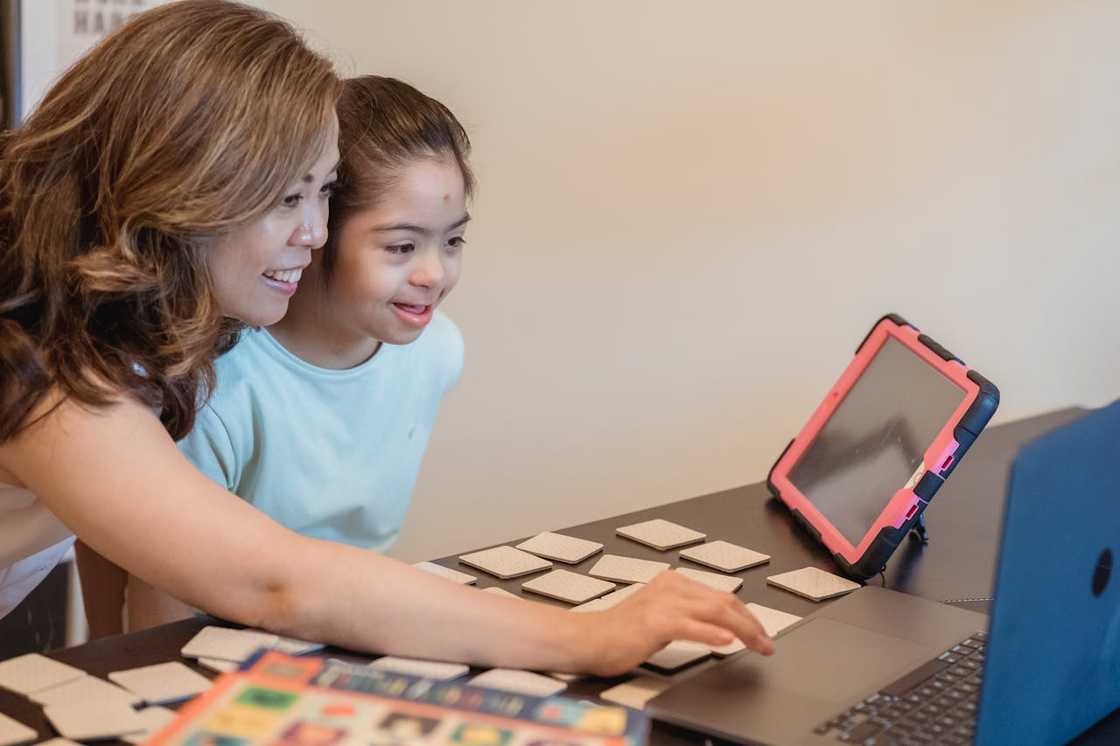She Walked Out of Handover in Tears — He Called Her Back, Fixed the Remark, and Drew a Plan
I still remember the sound of the plastic chair scraping across the classroom floor as I stood up. My daughter's report card trembled in my hands like something alive. "Attitude: Lazy," it said, printed neatly beside "Keep it up." The words did not make sense together, but the sting did.
MAKI-TINGIN KA NAMAN: Pwede ka nang mag-comment sa mga artikulo ng KAMI! Subukan mo, madali lang!

Source: UGC
Parents filled the classroom at a public primary school in Metro Manila, flipping through report cards, chatting about grades, and calculating school fees for the next term. I sat there, my heart tightening, my daughter's small hand pressed into my palm.
She was only nine, small for her years, and too kind to confront. Her eyes avoided mine as if she feared she had done something terribly wrong.
When I asked her teacher what "lazy" meant, he smiled politely and said, "She is bright, but she needs to push herself more."
It was not the words that hurt; it was the tone. It was as if he had already decided that my child would never try hard enough.
PAY ATTENTION: Follow us on Instagram - get the most important news directly in your favourite app!
I thanked him, gathered the papers, and stood up before the tears reached my eyes.
Outside, the heat of the midday sun wrapped around me. I sat under the mango tree near the gate and opened the report card again. "Lazy." A word too heavy for a child still learning how to believe in herself.

Source: UGC
Other parents walked past me with mixed faces: joy, frustration, relief. Some hugged their children, some scolded them. I just stared at the card, thinking of all the nights my daughter studied under our dim bulb, whispering, "Mummy, am I improving?"
That evening, she did not ask for ice cream as she usually did after handover. She sat on the edge of the bed and said softly, "Maybe I am really lazy."
Something inside me cracked.
That night, I lay awake listening to the ceiling fan and thinking of all the children who carry labels they do not deserve. I knew I could not let this one word define her.

Read also
My Grandma Fell and Lay Alone for Two Days — Until Her Neighbours Found Her and Saved Her Life
The next morning, I dressed early, packed her books, and walked her back to school. I told myself I was not going there to fight, but to understand.

Source: UGC
Maya, my daughter, had always been the quiet one. Not the loudest in class, not the quickest with answers, but she made an effort. Every evening after chores, she would sit at the dining table, her exercise books open, pencil tucked behind her ear.
Her father worked outside Metro Manila, so most evenings it was just the two of us: me balancing shop accounts, her murmuring spelling words under her breath. I raised her to believe effort mattered more than perfection.
In her early years, teachers praised her neat handwriting and her gentle nature. She was the child who stayed behind to sweep the class and share pencils when others forgot theirs. But in Primary Four, everything changed.
A new teacher, Mr Dela Cruz, joined the staff. He was known for being disciplined, organised, and strict to a fault. His classroom ran like a military camp. He believed children needed pressure to perform.

Source: UGC
At first, I admired his firmness. But soon, Maya started dreading Mondays.
"He says I think too slowly," she whispered one night. "He says I look at the board too long."
I brushed it off, saying, "He just wants you to focus."
But over time, I saw her confidence thinning like old paper. Homework that once took an hour stretched into three. She erased answers until holes appeared in her pages. I caught her chewing her pencil more than writing with it.
One night, she refused to draw, something she loved. "He said drawing is a distraction," she murmured.
That was when I realised something was deeply wrong.
So when I read that report card remark, I saw more than a careless word. I saw every sigh, every erasure, every tear-stained notebook.

Source: UGC
I knew teachers were human. I had been one myself years ago. I understood deadlines, overcrowded classrooms, and the fatigue that made you choose words without thinking. But I also knew how deeply a single adjective could bury a child's spirit.
That weekend, I replayed every conversation we had ever had about school. Her small victories, her quiet doubts. I realised how many times I had told her, "Try harder," instead of "You're doing well."
On Sunday night, I decided to go back. I would not scold anyone. I would ask for clarity.
But deep inside, I was walking back for every child who had been labelled before they had a chance to grow.
The morning sun was sharp when we reached the school gate. Pupils in green uniforms rushed in, laughing and waving their report cards. Maya held mine in her small hand, folded neatly as if she wanted to hide it from the world.

Source: UGC
At the school head's office, the secretary recognised me. "You are back for corrections?" she asked kindly.
"Just for understanding," I said.
When our turn came, Mrs Ramirez, the school head, looked up from a pile of files. Her calm voice reminded me of an older brother.
"What seems to be the issue?" She asked.
I handed her the report. "Madam, I just want to understand this remark."
She read it twice. "Lazy... and keep it up?" Her brow creased. "That is contradictory."
She called through the window, "Please tell Mr Dela Cruz to come."
A few minutes later, the class teacher entered, holding several marked papers. "Good morning, madam," he said quickly, glancing at me and Maya.
"Mr Dela Cruz," the head began, "please explain this remark."
He smiled uneasily. "It was meant to motivate her. I just wanted her to push harder."
"By calling her lazy?" I asked softly.

Source: UGC
He paused, shifting from one foot to another. "Madam, it was not personal. I only meant she does not apply herself fully."
The school head leaned back. "Words matter, Mr Dela Cruz. Children carry them longer than we imagine."
He said nothing. The office fell quiet except for the whir of the fan.
I could feel Maya's small hand tightening around mine. I looked at the teacher, not with anger but with exhaustion. "She stays up at night reading. She helps me in the shop and still does her homework. When she saw that word, she cried."

Read also
She Meets Him at the Bagels — He Installs Spyware; She Finds a Studio and Reclaims Her Life
The school head sighed. "We must be careful. Remarks are not just summaries of performance; they are mirrors."
The PTA chairwoman, who had been listening from the doorway, walked in. "This is not the first complaint," she said. "Several parents have mentioned confusing comments. Maybe we need to train teachers on feedback."

Source: UGC
The head nodded. "Yes, we will discuss it at the next meeting." She turned to Maya. "My dear, what do you enjoy learning the most?"
She hesitated. "Drawing... and stories," she whispered.
Something shifted in the room. The teacher's face softened. The school head took the report card and a red pen, hesitating before she spoke. "Can I correct this?"
She neatly crossed out "Lazy" and wrote, "Needs encouragement to build confidence. Shows steady effort."
The school head smiled. "Better. Guidance without injury."
Before we left, she added, "From next term, every teacher must hold a short one-on-one session with each pupil before writing final remarks."
Mr Dela Cruz followed us to the door. "Madam," he said quietly, "I will check on her progress personally. She has potential."

Read also
"She Failed the Test," Someone Whispers — Baby Kept in Nursery; Lab Memo Clears Her for Skin-to-Skin
That afternoon, Maya ran home holding a new paper, a "Goal Card." It had three lines:
Read one storybook weekly.

Source: UGC
Ask one question every day.
Believe in yourself.
At the bottom, both teacher and pupil had signed.
That evening, she showed it to me like a trophy. "Mummy," she said, "I'm improving already."
And for the first time in weeks, I saw her smile reach her eyes again.
A week later, Mrs Ramirez called me to school again. I thought it was about Maya, but it was something bigger.
She opened a file on her desk filled with report cards from every class. "We reviewed all remarks," she said. "Almost half had comments like ‘lazy,' ‘weak,' or ‘needs to try harder.'"
I gasped. "Half?"
"Yes," she replied. "We did not realise how negative language had become routine."
The PTA had held an emergency meeting and agreed to start a new model: the Growth Feedback System. Each remark would now include one positive recognition and one improvement goal, written clearly and kindly.

Source: UGC
She smiled. "Your question sparked the change."
Later, in the corridor, Mr Dela Cruz approached me. He looked humbled. "Madam," he said, "thank you for speaking up. I was trained to mark work, not hearts. Your daughter reminded me they are human first."
Maya's next report card arrived three weeks later. Under "Attitude," it said:
Quiet achiever, learning to speak up.
Under "Comment," it read:
Keep exploring ideas with curiosity.
She beamed when she read it. "Look, Mummy! He changed it himself."
When I looked up, I saw Mr Dela Cruz watching from the doorway. He gave a small nod.
That night, Maya told me, "I think I want to be a teacher one day. But I'll never write the word lazy."
I smiled. "Then you will be a good one."
By the next term, the changes had taken root. Every Friday, the teachers met small groups of pupils for a "Quiet Time" mentorship session—no punishment, no comparison, just listening.

Source: UGC
Maya thrived in those sessions. She kept a small blue notebook for her goals and reflections. On the cover, she wrote in pencil: "I am learning at my own pace."
At home, our conversations changed too. I stopped asking, "What did you score?" and began asking, "What did you learn?" She told me stories about helping a friend spell "mountain," about sketching the solar system for her class wall.
By mid-term, she earned a new badge: Quiet Achiever. She wore it proudly on her uniform.
When the PTA met again, the school head presented the new Words that Build policy. She showed before-and-after examples of teacher remarks and how pupils' confidence improved. Attendance had risen. Parents wrote thank-you letters.
Then Mr Dela Cruz stood up to speak. His voice was steady. "I once wrote a word that broke a child's spirit. Now I write to build it. I have learned that what we write on paper stays longer than what we say."

Read also
His Second Wife Tried to Take Everything — One Hidden Clause Flipped the Inheritance Overnight

Source: UGC
He invited Maya to stand beside him. "This is one of my best pupils," he said. The hall erupted in applause as she waved shyly.
After the meeting, he handed me a printed copy of the revised report template. A new column [Growth Plan] had been added.
He smiled. "You helped us see that kindness and accountability can exist on the same page."
Walking home, Maya held my hand tightly. "I'm proud of my teacher now," she said.
I nodded. "That means he is learning too."
The next term, the local education office visited the school. They praised the new approach and recommended it for nearby districts. Mrs Ramirez wrote a circular thanking parents for "constructive dialogue."
For me, it was never about confrontation. It was about understanding that language builds or breaks confidence.
One correction on a report card had become a blueprint for better teaching.

Source: UGC
And in a quiet classroom in Manhyia Methodist Primary, a little girl rediscovered her love for learning.
Looking back, I realise that real change began with a single careless word. "Lazy." It hurt, but it became the seed of transformation.
As parents, we often chase high grades, forgetting that tone matters as much as numbers. As teachers, we sometimes forget that a remark is not a label but a light.
Maya's story taught me that growth needs both grace and guidance. Correction should never crush curiosity.
Today, she still studies under that same mango tree. After finishing her homework, she writes her own remark at the top of the page: "Still trying, still proud."
Every time I read it, I smile. That small line reminds me that education is not just about performance. It is about belonging, about being seen.

Source: UGC
The school head once told me, "The remark box is a mirror. What we write reflects who we believe the child can become."
She was right.
Now, when I mentor younger parents at church, I tell them, "Ask your child what they learned, not just what they scored." Because curiosity, once praised, becomes confidence.
We live in a world quick to label but too slow to listen. But every label we refuse to repeat becomes an act of healing.
I learned that leadership, even in a classroom, begins with empathy. That a word of kindness can rebuild a broken confidence faster than any discipline.
So I ask you, reader: what words are you writing on the hearts of those you lead, teach, or love?
Are they labels that confine, or seeds that help them grow?
Because sometimes, the difference between shame and strength begins with the ink we choose.
This story is inspired by the real experiences of our readers. We believe that every story carries a lesson that can bring light to others. To protect everyone's privacy, our editors may change names, locations, and certain details while keeping the heart of the story true. Images are for illustration only. If you'd like to share your own experience, please contact us via email.
Bagong feature: Tingnan ang mga balitang para sa'yo ➡️ hanapin ang "Recommended for you" block at mag-enjoy!
Source: YEN.com.gh









